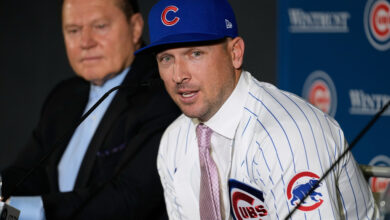
Cubs Announce Partnership with Sinclair on New Marquee Network
We’ve known about the the name and partner for a while, but the Cubs and Sinclair Broadcasting have now formalized a deal to launch Marquee Sports Network in February 2020. This comes via Bruce Levine of 670 The Score, who has been on top of the news on this matter from the start. The formation of a new network has been a reality for several years, but it’s only been within the last six months or so that it really gained traction.
Levine reported in August that the Cubs had hired Mike McCarthy, former president of the MSG Network and CEO of the St. Louis Blues, to carry the new network forward. Whether and in what capacity McCarthy will serve is unclear at this point, but Sinclair CEO Chris Ripley will be responsible for Marquee.
Though it’s going to represent a massive shift for those fans who grew up on the WGN, the reality is that the Cubs’ broadcasts rights have been shared by several partners over the last few years. And even with some very understandable trepidation about Sinclair’s involvement, having nearly every game in the same place will be a welcome change.
And it’s not just Cubs games, either, since Sinclair will be a 24-hour all-sports venture. What exactly they do to fill the extra 18-19 hours a day — if you figure 5-6 hours for games and the pre- and post- work — is yet unknown, but I think a show in which your 17th-favorite Cubs blogger sits down with random fans and pseudo-celebrities to discuss the team over beers would be a great idea.
Hey, Crane, if you’re reading, hit me up.
“I think this will be new and innovative, the way we handle our broadcast hours,” Kenney told 670 The Score. “We will hopefully begin with all of our spring training games being broadcast in 2020 — at the the very least, all of our home games from Sloan (Park). We don’t expect a broadcasting lull since we will broadcast baseball from February right through early November.”
There will likely be a main studio at Gallagher way, which has been the plan from the time the new office building was erected adjacent to Wrigley Field. And Kenney said that the old office just north on Clark would likely house production operations and auxiliary studios. Again, in case anyone with Marquee is reading, I’m happy to do my new show from either location.
The big question on everyone’s mind here probably deals with revenue and how much of it this new deal will generate. While we don’t yet have the specifics, it’s not believed to be anywhere near the $8.3 billion pact the Dodgers inked with Time Warner six years ago. That deal was fraught with issues from the start as high carriage fees prevented some local providers from broadcasting the network, leaving millions of Dodgers fans in Southern California unable to watch their team.
A prediction of a $6 carriage fee for Marquee raised both eyebrows and questions early in the year, though Sinclair is not concerned about running into the same issues.
“We are very confident we will get over that hurdle,” Ripley told Levine. “The Cubs and what they mean to Chicago and their fans versus the Dodgers — not to belittle the Dodgers — there are just areas of LA (in which) they are not that important. I want to say how excited we are to be partnering with such a storied franchise like the Cubs and be involved in this great city of Chicago.”
Okay, but will it give the Cubs enough financial breathing room to pursue a major addition. Like, say, a guy whose name rhymes with Rice Larper?
“I think the way this thing is most likely to work when it comes together is the first few years of any new setup will be really similar to what we’ve had in the past as far as the money coming in,” Epstein told 670 The Score in early January. “But then with continued growth and success as the thing develops and the team on the field stays successful, you can see the potential for greater growth into the future.”
So take that for what it’s worth, but the short answer is that it doesn’t sound as though either the network announcement or the reduction of the Cubs’ debt payments will free up enough cash for a meaningful free agent splash this summer. This all makes you wonder how the revenue from Marquee is structured and whether it’s more of a shared arrangement rather than just a massive influx in which Sinclair is hoping to make their money back through ads and carriage fees.
I suppose we’ll find out more of those details soon enough.
Ed. note: Kenney had noted during a panel with Cubs bloggers at Cubs Convention in January that the shifting media ecosystem was delaying any announcement. He could name mention any potential partners by name, but did indicate that uncertainty surrounding the bidding for the 22 FOX Sports RSNs was a factor. He also put a 30-day window on the decision and they actually came in under that by about a week.
Sinclair had been in the mix for those networks, but has reportedly dropped out of the process. But according to CNBC’s David Faber, the media giant “may seek to join another bid.” It makes sense that exiting the process would free Sinclair up to finalize things with the Cubs, which might also allow them to piggyback with someone else.
Owning hundreds of local stations offers a fair bit of clout, but having the strength of a couple dozen regional sports networks would increase things that much more. Think of it like Barry Bonds during his time in Pittsburgh vs. what he was able to do in San Francisco.

